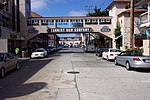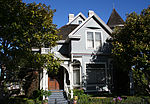Pacific Biological Laboratories
1923 establishments in California1940s disestablishments in CaliforniaAmerican companies established in 1923Biology and cultureBuildings and structures in Monterey County, California ... and 9 more
History of Monterey County, CaliforniaIndustrial buildings and structures on the National Register of Historic Places in CaliforniaIndustrial buildings completed in 1937John SteinbeckLaboratories in CaliforniaMonterey, CaliforniaMonterey BayNational Register of Historic Places in Monterey County, CaliforniaWikipedia page with obscure subdivision

Pacific Biological Laboratories, abbreviated PBL, was a biological supply house that sold preserved animals and prepared specimen microscope slides, many of which were of maritime aquatic species, to schools, museums, and research institutions. It was located in a building on what is now Monterey's Cannery Row on Monterey Bay in Monterey County, California. The building, activities, and business were fictionalized as "Western Biological Laboratory" by John Steinbeck in his novel Cannery Row, as was a character based on one of its founders, Ed Ricketts. After a 1936 fire Steinbeck invested in the laboratory and owned half its stock.
Excerpt from the Wikipedia article Pacific Biological Laboratories (License: CC BY-SA 3.0, Authors, Images).Pacific Biological Laboratories
Reeside Avenue, Monterey New Monterey
Geographical coordinates (GPS) Address Nearby Places Show on map
Geographical coordinates (GPS)
| Latitude | Longitude |
|---|---|
| N 36.616944444444 ° | E -121.89972222222 ° |
Address
Edward F. Ricketts State Marine Conservation Area
Reeside Avenue
93944 Monterey, New Monterey
California, United States
Open on Google Maps







